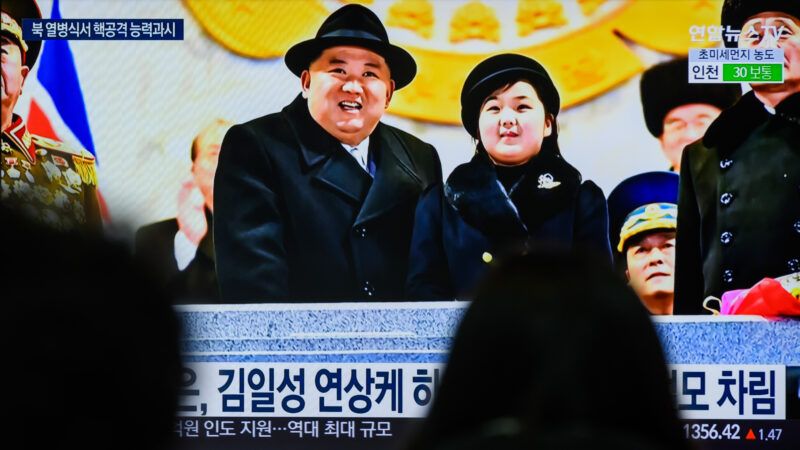How To Answer North Korea's New Nuclear Taunt
Denuclearization is not possible at any remotely acceptable price, and that may not change for decades to come.

North Korea's parade of intercontinental ballistic missiles (ICBMs) on Wednesday was certainly an impressive show. Whether it was more than a show—whether the large missile canisters which rolled through the capital of Pyongyang were functional solid-fuel missiles capable of delivering a nuclear strike to the U.S. mainland—is harder to say. But even if the new ICBMs on display weren't ready for use, as some experts have speculated, there's no denying the North Korean regime is on an unsettling trajectory as of late.
Last year was by far the isolated nation's busiest on record for missile testing, and in September, dictator Kim Jong Un made his rationale for this arsenal newly explicit: He views the United States' attempts to denuclearize the Korean Peninsula as a regime change project and, accordingly, will neither give up his nukes—no matter the severity of international pressure or his own promises to then-President Donald Trump in 2018—nor legally limit his nuclear use to defensive strikes. Kim has drawn "an irretrievable line," he said, "so that there can be no bargaining over our nuclear weapons."
Even if we read this new ICBM display as a sullen invitation to renewed talks (and Pyongyang says it wants nothing of the sort), the overall trend is grim. If North Korea is unwilling to consider denuclearization, and Washington—per Biden administration policy, reaffirmed as recently as last month—is unwilling to consider anything else, are we at a final impasse? Is this the end of nuclear diplomacy with North Korea?
It doesn't have to be. Though alarming, nothing here marks a substantive shift in North Korean policy. There's a basic continuity in the Kim regime's goals as well as its constraints.
Unfortunately, there's also a basic continuity in Washington's denuclearization delusion, which constantly undercuts any chance of real progress in negotiations. If this latest show of force from Pyongyang changes anything, then, it should be to shift U.S. policy toward a recognition that our extant deterrence capabilities can maintain an imperfect but demonstrably tolerable status quo within which we can pivot to more achievable, incremental diplomatic aims.
That shift is particularly needed now, as rising tensions and a comparatively hawkish administration have South Korea—usually the voice of reason in the Korean-U.S. triad—hinting at a newly escalatory approach. Since the start of the new year, when Kim ordered the "exponential" expansion of his nuclear cache, South Korean President Yoon Suk-yeol has repeatedly signaled he's considering a more aggressive posture. He's floated ideas including U.S.-South Korean drills involving American nuclear weaponry, South Korean development of its own nuclear arsenal, and Seoul jettisoning the military agreement that came out of 2018's inter-Korean talks.
Those options would mark a significant change from years of South Korea walking basically the path Washington should follow. "The priority should be on deterring the use of nuclear weapons," South Korean Defense Minister Lee Jong-sup said just this past October, "by giving [Pyongyang] a clear sense that if North Korea attempts to use nuclear weapons, it will bring about an end to the North Korean regime and it will disappear completely."
Unlike denuclearization, that's a viable strategy, because the North Korean government has long signaled Kim's belief, informed by the last two decades of U.S. policy in Iraq and Libya, that American intentions are less about peace than Kim's own ouster.
This is unflattering but, as the Cato Institute's Doug Bandow argued at Foreign Policy, not irrational. "History proves that powerful nuclear deterrence serves as the strongest treasure sword for frustrating outsider's aggression," said a North Korean state media editorial in 2016. Deposed and dead despots Saddam Hussein and Muammar al-Qaddafi couldn't "escape the fate of destruction after being deprived of their foundations of nuclear development and giving up undeclared programs of their own accord," the article continued. It's clear Kim intends to be too canny to make the same mistake.
The point of Kim's tests and comments over the last year, then, is a message for the world generally and the U.S. specifically: North Korean nuclear weapons aren't going anywhere, and North Korea is not interested in negotiating as if they were.
The right response for Washington is not to give up on diplomacy, let alone to reify Kim's regime change fears by joining Seoul in its new hobby of saber-rattling. It is—as our approach should have been all along—to pursue realistic diplomatic outcomes which will help keep the peace.
That means setting aside denuclearization as a goal for the foreseeable future. Instead, President Joe Biden should bargain for incremental steps like a nuclear freeze, a peace treaty for the Korean War, and at least an economic opening of North Korean society to improve ordinary North Koreans' basic quality of life.
All the while, despite Kim's habitual belligerence, as long the U.S. and our allies do not initiate war with North Korea, U.S. conventional and nuclear deterrence should continue to hold. Beyond its nuclear arsenal, Pyongyang is fundamentally weak, and Kim's will to power (not to mention his will to live) works in our favor here.
None of those incremental goals, if accomplished, would directly denuclearize North Korea. But denuclearization is not now possible at any remotely acceptable price, and that may not change for decades to come. What is possible is increased stability and normalcy, fewer parades and weapons tests, more productive talks, better and freer lives for the North Korean people, and a lessened risk of global catastrophic warfare.
All of that is no less true than it was before this apparent new ICBM build, and these achievements could, very slowly, lay a foundation for Kim's denuclearization "never" to someday become a "maybe."

Show Comments (48)